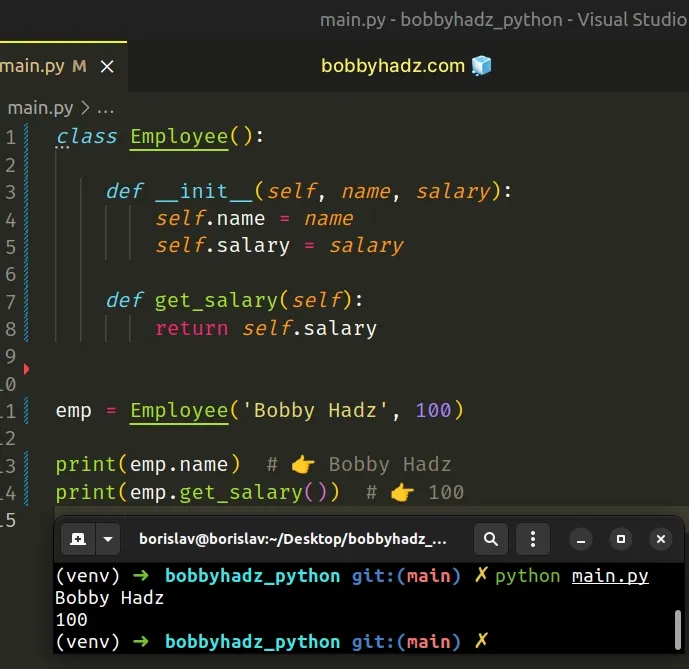TypeError: Class() takes no arguments in Python [Solved]
Last updated: Apr 8, 2024
Reading time·3 min

# TypeError: Class() takes no arguments in Python
The Python "TypeError: Class() takes no arguments" occurs when we forget to
define an __init__() method in a class but provide arguments when
instantiating it.
To solve the error, make sure to define the __init__() (two underscores on
each side) method in the class.

Traceback (most recent call last): File "/home/borislav/Desktop/bobbyhadz_python/main.py", line 62, in <module> emp = Employee('Bobby Hadz', 100) ^^^^^^^^^^^^^^^^^^^^^^^^^^^ TypeError: Class() takes no arguments TypeError: Object() takes no arguments
Here is an example of how the error occurs.
class Employee(): def get_salary(self): return self.salary # ⛔️ TypeError: Employee() takes no arguments emp = Employee('Bobby Hadz', 100) print(emp)
We haven't defined an __init__() method but are passing arguments to the class.
When a class is instantiated, its __init__() method gets called with the
supplied arguments.
# Define an __init__ method to solve the error
To solve the error, make sure to define an __init__() method or correct your
spelling if your class already has one.
class Employee(): def __init__(self, name, salary): self.name = name self.salary = salary def get_salary(self): return self.salary emp = Employee('Bobby Hadz', 100) print(emp.name) # 👉️ Bobby Hadz print(emp.get_salary()) # 👉️ 100

__init__ (two underscores on each side).def __init__(self, name, salary): # ✅ Correct def _init_(self, name, salary): # ⛔️ Incorrect def __init(self, name, salary)__: # ⛔️ Incorrect
If you mistype the __init__ method in the class's definition, it won't get
invoked when the class is instantiated.
When a class defines the __init__() method, the method is invoked when an
instance is created.
The following line calls the __init__() method of the class.
emp = Employee('Bobby Hadz', 100)
If you pass arguments when instantiating a class, the arguments are passed on to
the __init__() method.
The __init__() method isn't supposed to return anything.
Note that the first argument the __init__() method takes is
self.
def __init__(self, name, salary): self.name = name self.salary = salary
You could name this argument anything because the name self has no special
meaning in Python.
self represents an instance of the class, so when we assign a variable as
self.my_var = 'some value', we are declaring an instance variable - a variable
unique to each instance.
When defining the __init__ method, make sure you have indented the code block
consistently.
class Employee(): def __init__(self, name, salary): # ⛔️ Forgot to indent the method self.name = name self.salary = salary
If the method isn't indented correctly, you will either get an error or the method won't run when you instantiate the class.
Note that unlike other methods, the __init__ method isn't supposed to return
anything.
The method is used to assign properties to the newly created class instance.
If you use a return statement in your
__init__ method, you'd get an error:
TypeError: __init__() should return None, not 'X'.
# Additional Resources
You can learn more about the related topics by checking out the following tutorials:
- Call a class method from another Class in Python
- Purpose of 'return self' from a class method in Python
- Convert a string to a Class object in Python
- Creating class instances from a Dictionary in Python
- How to Create an incremental ID in a Class in Python
- How to get the File path of a Class in Python
- How to Update or access Class variables in Python
- How to access Parent class Attributes in Python
- Error: filename.whl is not supported wheel on this platform

